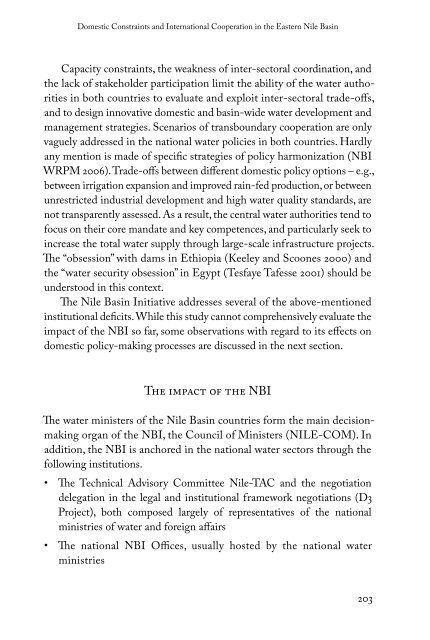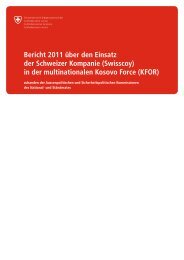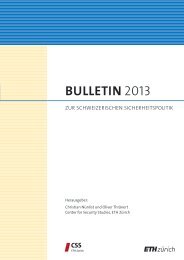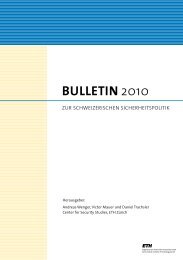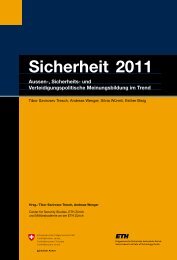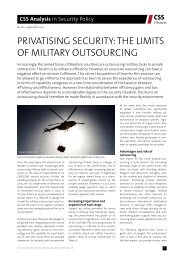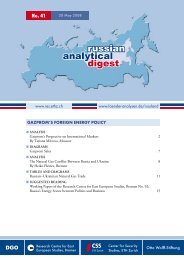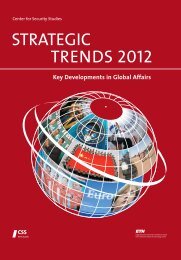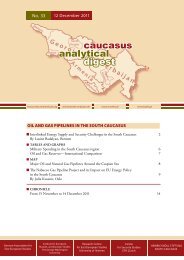Double-Edged Hydropolitics on the Nile - Center for Security Studies ...
Double-Edged Hydropolitics on the Nile - Center for Security Studies ...
Double-Edged Hydropolitics on the Nile - Center for Security Studies ...
You also want an ePaper? Increase the reach of your titles
YUMPU automatically turns print PDFs into web optimized ePapers that Google loves.
Domestic C<strong>on</strong>straints and Internati<strong>on</strong>al Cooperati<strong>on</strong> in <strong>the</strong> Eastern <strong>Nile</strong> Basin<br />
Capacity c<strong>on</strong>straints, <strong>the</strong> weakness of inter-sectoral coordinati<strong>on</strong>, and<br />
<strong>the</strong> lack of stakeholder participati<strong>on</strong> limit <strong>the</strong> ability of <strong>the</strong> water authorities<br />
in both countries to evaluate and exploit inter-sectoral trade-offs,<br />
and to design innovative domestic and basin-wide water development and<br />
management strategies. Scenarios of transboundary cooperati<strong>on</strong> are <strong>on</strong>ly<br />
vaguely addressed in <strong>the</strong> nati<strong>on</strong>al water policies in both countries. Hardly<br />
any menti<strong>on</strong> is made of specific strategies of policy harm<strong>on</strong>izati<strong>on</strong> (NBI<br />
WRPM 2006). Trade-offs between different domestic policy opti<strong>on</strong>s – e.g.,<br />
between irrigati<strong>on</strong> expansi<strong>on</strong> and improved rain-fed producti<strong>on</strong>, or between<br />
unrestricted industrial development and high water quality standards, are<br />
not transparently assessed. As a result, <strong>the</strong> central water authorities tend to<br />
focus <strong>on</strong> <strong>the</strong>ir core mandate and key competences, and particularly seek to<br />
increase <strong>the</strong> total water supply through large-scale infrastructure projects.<br />
The “obsessi<strong>on</strong>” with dams in Ethiopia (Keeley and Sco<strong>on</strong>es 2000) and<br />
<strong>the</strong> “water security obsessi<strong>on</strong>” in Egypt (Tesfaye Tafesse 2001) should be<br />
understood in this c<strong>on</strong>text.<br />
The <strong>Nile</strong> Basin Initiative addresses several of <strong>the</strong> above-menti<strong>on</strong>ed<br />
instituti<strong>on</strong>al deficits. While this study cannot comprehensively evaluate <strong>the</strong><br />
impact of <strong>the</strong> NBI so far, some observati<strong>on</strong>s with regard to its effects <strong>on</strong><br />
domestic policy-making processes are discussed in <strong>the</strong> next secti<strong>on</strong>.<br />
The impact of <strong>the</strong> NBI<br />
The water ministers of <strong>the</strong> <strong>Nile</strong> Basin countries <strong>for</strong>m <strong>the</strong> main decisi<strong>on</strong>making<br />
organ of <strong>the</strong> NBI, <strong>the</strong> Council of Ministers (NILE-COM). In<br />
additi<strong>on</strong>, <strong>the</strong> NBI is anchored in <strong>the</strong> nati<strong>on</strong>al water sectors through <strong>the</strong><br />
following instituti<strong>on</strong>s.<br />
• The Technical Advisory Committee <strong>Nile</strong>-TAC and <strong>the</strong> negotiati<strong>on</strong><br />
delegati<strong>on</strong> in <strong>the</strong> legal and instituti<strong>on</strong>al framework negotiati<strong>on</strong>s (D3<br />
Project), both composed largely of representatives of <strong>the</strong> nati<strong>on</strong>al<br />
ministries of water and <strong>for</strong>eign affairs<br />
• The nati<strong>on</strong>al NBI Offices, usually hosted by <strong>the</strong> nati<strong>on</strong>al water<br />
ministries<br />
203


